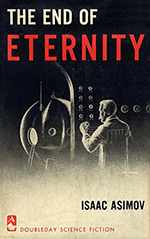
![]() couchtomoon
couchtomoon
11/30/2015
![]()
And here's another sci-fi romance, dated forty years earlier, by Mr. One-of-the-Big-Three Himself, Isaac Asimov.
Andrew Harlan works as an Eternal Technician, analyzing and recommending Minimum Necessary Changes (MNC) in Reality, in order to protect Reality. When he meets Noÿs Lambent, a non-Eternal from a Century far from his own, he falls in love and attempts to save her from the upcoming MNC that could destroy her existence as he knows it. But is he just playing into the hands of his superiors? Or, perhaps, a more powerful guiding force?
Like Remake (1995), which I reviewed yesterday, it's another "he barely met her, but now he desperately loves her" kind of book. And also like Remake, it's easy to dump this book for its dull, old-fashioned tone and predictable sexist relationship patterns. However, both books' faults lie in their shared purpose: a tongue-in-cheek critique of social standards, although Asimov's tongue might be less in his cheek and more buried in sci-fi pseudo-jargon for '50s sci-fi geeks to notice the social disconnect.
Throughout the novel, Harlan's notions toward Noÿs are alarmingly sexist. He criticizes her scanty, but time-relevant clothing and her possibly numerous sexual liaisons. As her boyfriend, he disregards her as a simpleton--a very soft, supple simpleton. (He also refers to her as property, but so does everybody in this book.) He's surprised when she quickly understands the nature of his job. HE'S SURPRISED TO DISCOVER SHE OWNS A BOOK ABOUT HISTORY AND ECONOMICS.
And then, when Harlan realizes that Noÿs is actually the agent of another more powerful group working against the Eternals, he's like, "Of course she's working against us! She had that book about History and Economics!" (239)
It's easy to mislay this sexism on the book itself and throw it across the room and then walk over to it and stomp on it and spit on it and then contact the local waste disposal authorities for a special pick up because you're not touching that thing again.
But, if you pay attention, something's not quite right about Harlan. From the start, we sense Harlan is a bit more uptight than his colleagues when he describes Noÿs' homewhen:
It was an era without ethics or principles... It was hedonistic, materialistic, more than a little matriarchal..." in which Harlan desires to enact a Change to create "... a branch in which millions of pleasure-seeking women would find themselves transformed into true, pure-hearted mothers. (25)
If that's not narrator sarcasm about an unlikeable protagonist, then, For Time's Sake, I don't know what is. And then Harlan's hated supervisor, Computer Finge (not a computer), instructs Harlan to get a girlfriend. Finge explains:
You would become less concerned about the details of a woman's costume, less disturbed about her possible personal relations with other Eternals. (55)
Chill out, man, he says. You wouldn't be so sexist if you would just get laid. Oh, Asi, if it were only that easy!
Feedback on Twitter says I'm reading too much into this, however, I disagree. For one thing, Harlan's POV of Bayta is extremely, extremely sexist– from my modern sci-fi perspective, certainly– but from a '50s sci-fi perspective, it's also a little overcooked.
In addition, having read some of Asimov's earlier and later works, Asimov has always been more amenable to gender equality than some sci-fi writers. Even his stodgy Foundation series has some real women of agency (Bayta!), so it's jarring to see such an old-fashioned depiction of a female character in EoE, just a few years afterFoundation and Empire (1952), especially when considering Harlan's criticisms of Noÿs' scanty clothing and liberated sexual mores, which are basically the only part of feminism that most vintage (and today's!) SF writers seem to embrace. For Asimov to unironically characterize Harlan in this way would be contrary to his own worldview.
And finally, consider that Bester and Sturgeon and Clarke and Leiber and Kornbluth have been drawing female characters with intelligence and agency* for years by this point. Harlan's viewpoint of Noÿs would only make sense in a Robert Heinlein novel.
So, am I saying The End of Eternity is an important piece of feminist science fiction? No. Like most sci-fi writers of the time (male and female, unfortunately), Asimov is enacting the most Minimum Necessary Change possible to portray a gender-equal world, without scaring readers (and himself) with a true gender revolution. (And Asimov wasn't exactly the smoothest PC-guy of his time, either.) But I am saying that, should you read this (and you might not want to because it's mostly just a boring romance with some pseudo-jargon) fight the urge to throw it away after 30 pages, because Noÿs is actually a surprising and interesting character, she turns out to be the good guy, and Harlan's sucky POV is designed to be sucky.
Other things of note:
*By "agency," I mean '50s-style agency. So, you know, not cooking and nagging and being afraid all the time.
http://couchtomoon.wordpress.com